It was standing room only at the Landmark Hotel in central London on Wednesday, 20 March, as over 150 people packed in to hear the keynote speakers at the CBBC’s annual UK-China Business Forum.
CBBC Chair Sir Sherard Cowper-Coles opened the event, stating that it was “a symbol of strength between our two great countries that so many want to take part in this great event.” He went on to say that trade between the UK and China broke all records in 2023 with a trade value of over £110bn and that Hong Kong and China have overtaken Germany as the UK’s second-largest economic partners.
It would be foolish, he said, for the UK not to engage in trade with a country that boasts most of the leading technologies of the 21st century. He also emphasised that Chinese savers and consumers were eager to put their savings into wealth management, insurance and pension products designed and spearheaded here in the UK.
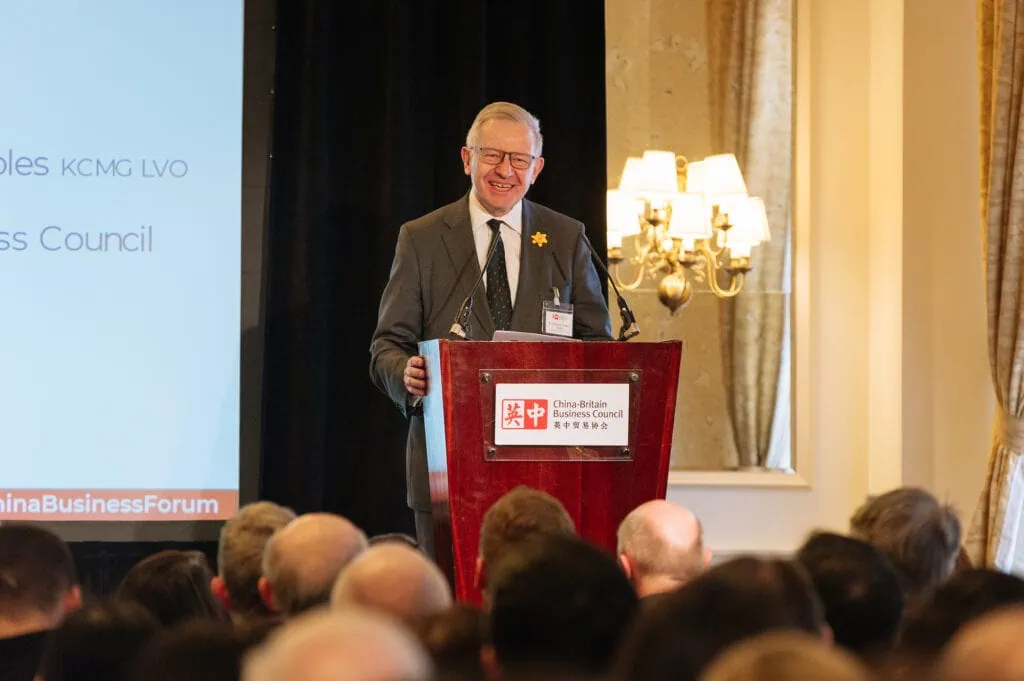
Sir Sherard Cowper-Coles giving his keynote address
During the keynote addresses, delegates also heard from Bim Afolami, Economic Secretary to the Treasury, who said that the UK government is committed to growing the China relationship and working together on global challenges, particularly climate change, infrastructure and supply chain resilience.
He noted that China’s commitment to achieving carbon neutrality by 2060 will require an estimated £17-35 trillion of investment, 90% of which will come from the private sector, and the UK has set a target to become the first net zero financial centre.
Chinese Ambassador to the UK Zheng Zeguang said that “of course, there have been ups and downs in our relations, but the overall trend has been upward and forward.”
He pointed out that the policies set out in China’s annual Two Sessions can be summed up in four keywords: confidence, development, openness and cooperation.
The first is confidence in the country’s economic prospects, with a target of 5% GDP growth this year.
“The long-term trajectory of China’s economy remains positive, as it enjoys the following unique strengths: strong political leadership, a supersize market, a full-fledged industrial system, abundant, high-calibre labour forces, and constantly improving sci-tech innovation capacity,” he said.
The second point is development. “China is firmly committed to advancing high-quality development and the Chinese path to modernisation,” said Ambassador Zheng. “Marked by innovation, these forces will help transform traditional industries, making them more advanced, intelligent and environmentally friendly.”
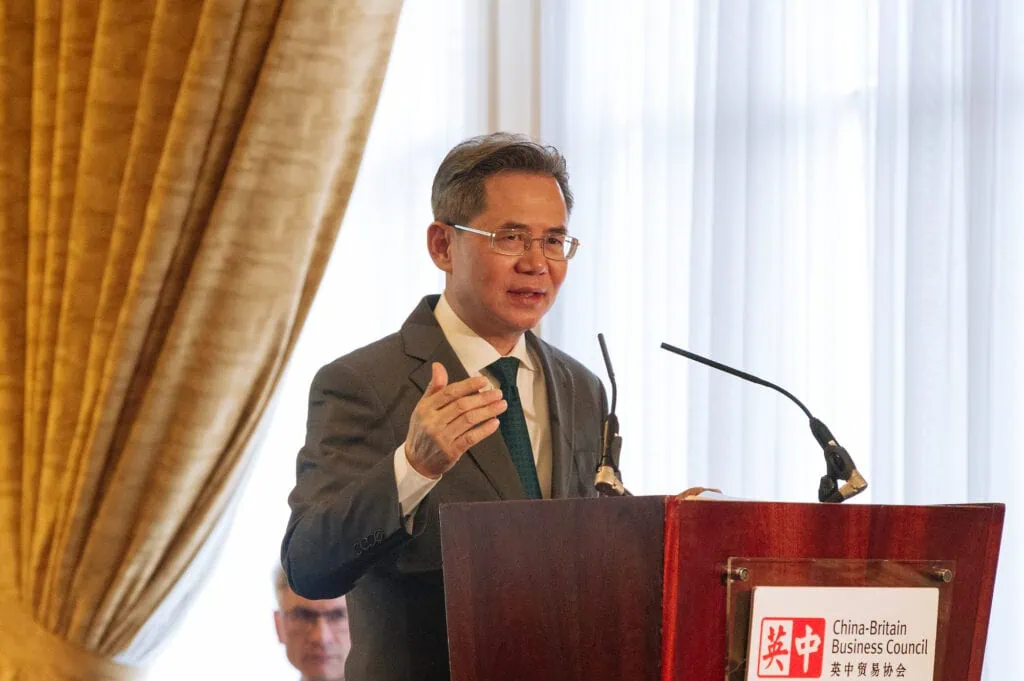
Ambassador Zheng Zeguang, Chinese Ambassador to the United Kingdom, giving his keynote address
“China has some 400,000 high-tech companies and ranks second globally in terms of number of unicorn start-ups. Of the 153 ‘lighthouse factories’ on the Global Lighthouse Network released by the World Economic Forum, 62 are Chinese.”
The third is openness. “China will pursue higher-standard opening up and promote mutual benefits,” said the Ambassador. “We will promote alignment with high-standard international economic and trade rules, steadily expand institutional opening up, and amplify the interplay between domestic and international markets and resources. We will ensure the overall stable performance of foreign trade and foreign investment and foster new strengths in international economic cooperation and competition.”
The fourth and final word was cooperation. “Facts have proven that China’s development provides a vast market, high-quality and affordable products, increasingly advanced technologies, and, of course, much-needed investment for the world. Last year, China contributed to around one-third of global growth. China’s development will continue to inject stability and impetus into the world.”
“Over the years, CBBC has served as an important bridge for China-UK communication and a strong catalyst for China-UK cooperation. We look forward to closer cooperation with CBBC and the British business community going forward,” he said.
Opening Plenary: Setting the Scene
The first of three plenary speakers was Christopher Davies, Deputy Chief Executive Officer, HSBC Continental Europe, the largest foreign bank operating in China. Davies said that although not everything is rosy in this trade corridor, he sees reasons for optimism and pools of opportunity. “Growth of 5% will take all sorts of efforts, but our view in the medium term is that there is plenty of growth ahead due to basic demographics,” he said.
According to HSBC’s annual China Sentiment Survey, 87% of clients were planning on expanding their business in China, indicating that support for investment was there. Davies said there was a bias towards tech-heavy sectors, sustainable energy, and electric vehicles and their supporting sectors and digital services. He also noted that it was UK businesses who were foremost in their positivity towards China.
Opportunities also exist for UK companies in the financial services sector. Eighty million more people will join the middle-class segment by the end of the decade, taking China’s middle class to 40% of the population. This middle class will bring with them “an appetite for quality wealth management”.
Davies also said that sustainable financing and inbound investment into sustainable technologies in the UK are very strong opportunities.
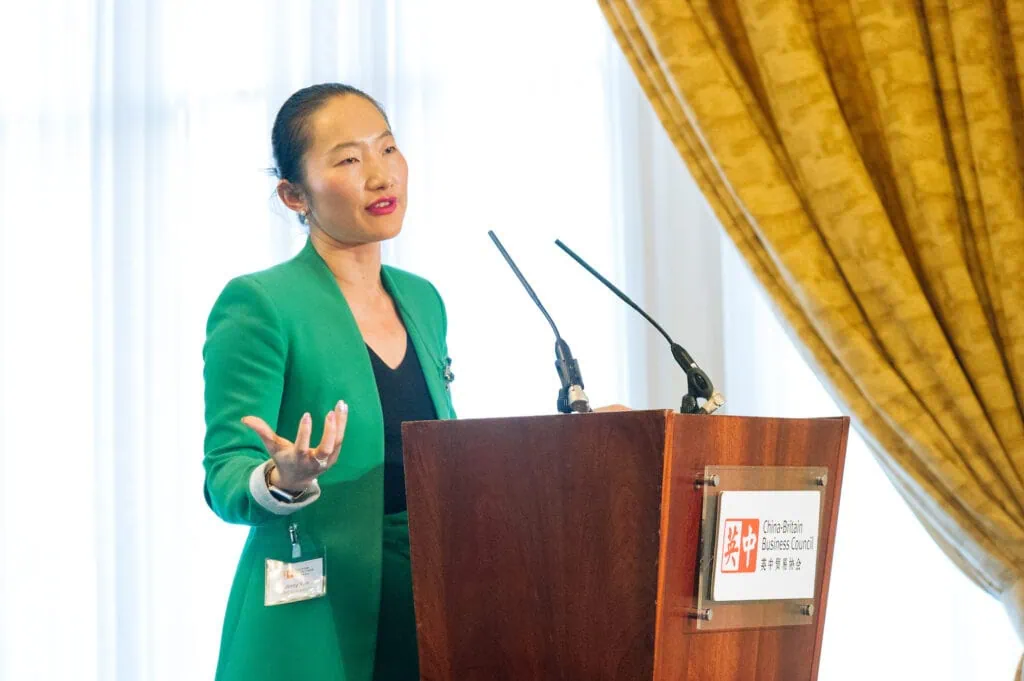
Jinny Yan addressing the delegates at the forum
Jinny Yan, Managing Director, ICBC Standard Bank, talked about the new buzzword that came out of the annual Two Sessions: ‘New Productive Forces’. She broke the phrase down into ‘three highs’ – high quality, high efficiency and high technology – and ‘three news’ – new supply chains, new industries and new digital economy.
China’s economy, Yan said, was shifting from high quantity to high quality. An ageing population limits growth, so in order to invigorate the economy, China needs to find new growth engines. To date, this has included moving away from investment to consumption. China’s post-Covid recovery, she said, was largely down to consumption with a focus on necessities rather than luxuries.
China is also “rethinking how to make its growth model and supply chains more resilient to external forces,” she said. The next phase of Chinese growth will be in new energy, healthcare, biosciences, and supply chains.
She also said there is a trend for commodity transitions to be settled in RMB, from which financial centres such as London and Singapore will benefit as the world’s second-largest economy continues to open up and China’s currency internationalises.
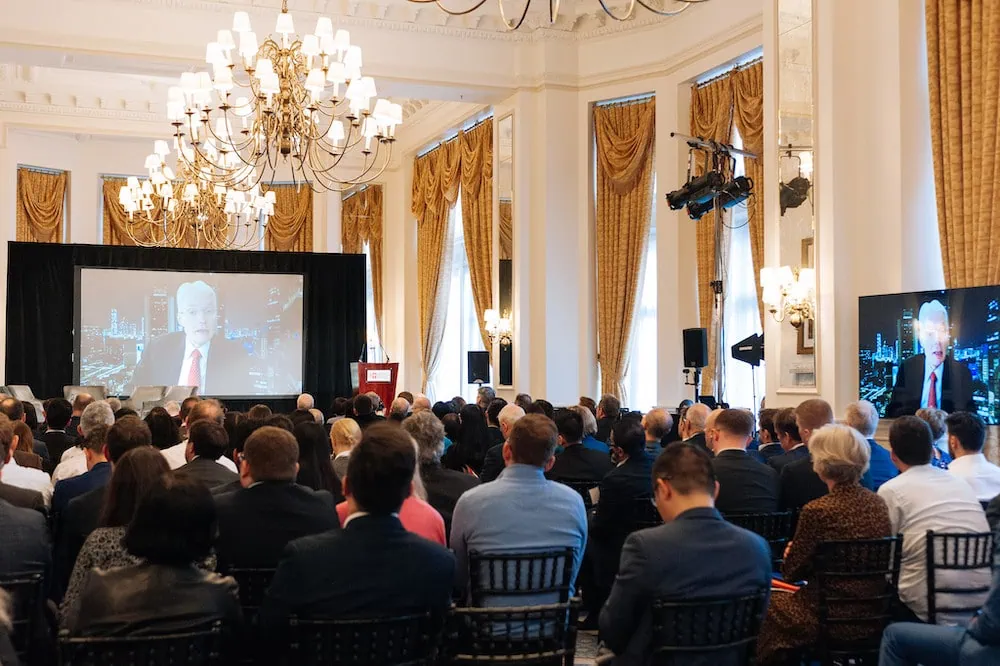
Gordon Orr speaking at the forum via video link
Gordon Orr, Non-Executive Director of Swire Pacific, Meituan, Lenovo and EQT, provided a number of examples of British companies that are continuing to grow in China, mentioning that IHG has opened 100 hotels in China in the past year, bringing their total to over 700 hotels – with plans for another 500 in the pipeline. Merlin will open two of the world’s largest Legoland parks in China, and Swire has acquired interests in private hospitals in China. Fidelity has raised over £700 million for a fixed mutual fund, and Schroders has a license to run a 100% private investment facility. AstraZeneca continues to invest hundreds of millions into China and has licensed obesity drugs from China.
All this, he says, “is happening during an economic reset, and whilst the challenges in the housing market have led to reduced consumer confidence.” Although many SMEs have not recovered as well as larger companies, every industry transition “will always create losers as well as winners,” Orr said.
Orr also said there has never been a better time for finding talent from China, especially within the STEM sector, where grads are looking for stable roles in international companies.
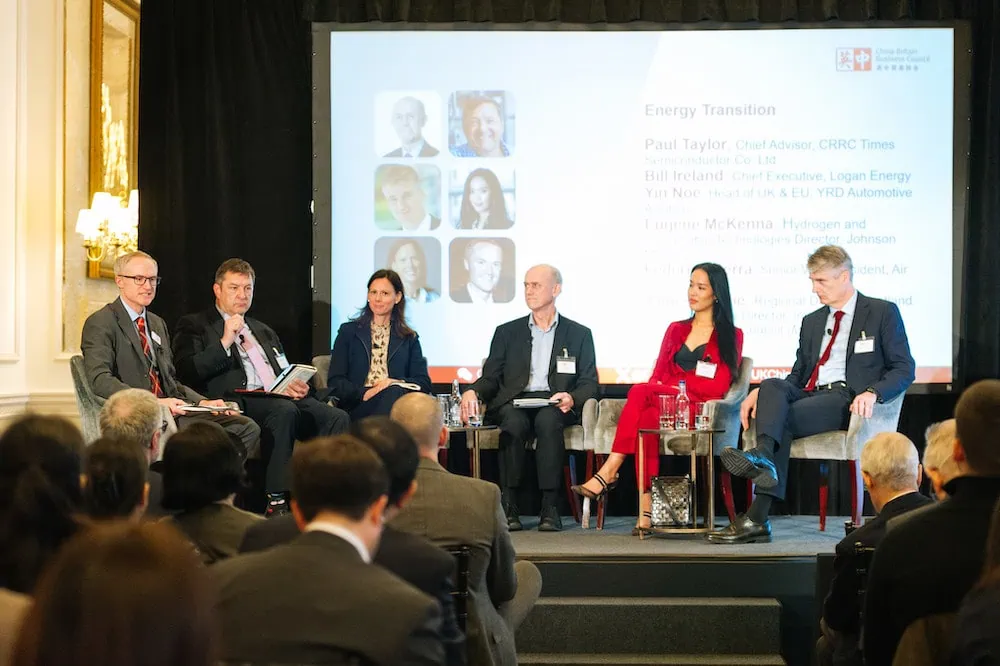
The first panel of the day was on the energy transition
Panel 1: Energy Transition
The first of the UK-China Business Forum 2024 panel discussions was on the energy transition. CBBC’s James Brodie moderated the talk, noting that China has invested huge amounts into green energy and that green energy production overtook coal power energy in June 2023.
Bill Ireland, CEO, Logan Energy, explained that if we want to achieve net zero by 2050, companies and countries need to work together to enable the shift from oil and coal that has dominated for the last 150 years to new technologies. Logan Energy has been working on a number of projects, including exporting hydrogen refuelling stations; decarbonising the Yangtze and converting marine vessels on the famous river; working with fuel cell companies; and helping Chinese companies to comply with EU regulations, enabling them to export to the EU market.
“Our strategy is partnering with the right people in the right way, and Chinese manufacturers are likely to meet that game,” says Ireland. Ireland said that he is excited about the “boundless” opportunities around energy transition and China. He emphasised that Chinese investment and support are paramount to achieving net zero and reducing CO2 emissions. “We don’t have the capacity to meet the demand [for net zero technologies] in the UK,” he said. “It’s a symbiotic relationship we need to have.”
Federica Berra, Senior Vice President, Air bp, explained how Air bp has been working to create and distribute sustainable aviation fuel (SAF). “The aviation business is expected to double by 2040 as the middle class rises and more people fly,” she said. “And aviation represents 2% of global carbon emissions and 12% of transportation sector emissions.”
She said that we will see hydrogen, battery and electric aeroplanes providing short to medium-haul flights, but they all require new aeroplanes. For long-haul flights, “drop-in” SAF fuel is needed, which means aeroplanes don’t need to be altered. Next year, 2% of all fuel must be SAF, but current regulations limit the amount of SAF that can be put into a plane to just 30%.
Berra recently flew from London to New York on a Virgin aircraft with Rolls Royce engines that was 100% fuelled by bp SAF, proving that the technology is there. And with bp in 40 countries and 600 airports, it’s now up to the regulators to further encourage SAF usage internationally.
Eugene McKenna, Hydrogen and Sustainable Technologies Director, Johnson Matthey, helps businesses pivot towards the clean energy transition and works with bp on SAF production and distribution.
“We need supply, transportation, storage and demand all to develop at the same time. China is solving those market challenges better than the West because it is mandated,” he said. McKenna is also pushing for global cooperation. “Every ton of CO2 avoided anywhere in the world is avoided on behalf of all of us. It helps us equally regardless of where it is collected from,” he said.
Yin Noe is Head of UK & EU for the YRD Automotive Alliance, an alliance of over 500 Chinese automotive manufacturers that was created to promote the electrification of vehicles and the national grid networks. Its extensive experience over the last two decades now sees it helping EU and UK companies transition to electrification.
“China invested billions of dollars 15 years ago to make EVs affordable,” she said, going on to explain that, unlike Western legacy combustion engine car manufacturers, Chinese car companies started with EVs, and thanks to investment and many years of experience, they now dominate the market. However, she says, there is still resistance to working with Chinese OEMs, with concerns over quality and industrial espionage. The question is: do we want a carbon-zero future, or do we want to protect EU legacy brands?
Paul Taylor, Chief Advisor, CRRC Times Semiconductor Co. Ltd, said that “we have to become more receptive to Chinese products. Some people are [living in the past], and their perception is guided by that. China supplies the highest quality, lowest cost products and has what we need to achieve net zero,” he said.
Taylor went on to explain that the long history and government support of Chinese EV manufacturing has made it the most competitive and safe in the world. For example, CRRC was originally a bullet train manufacturer, but it has now moved into EV and electric bus manufacturing. It invested in Taylor’s semiconductor company in 2007 to ensure it owns the full supply chain from microchip to finished vehicle.
“In China, the state decided a long time ago to focus on EV manufacturing and technology, but in the UK, it’s very slow and constrained because of policy,” Taylor said. “Businesses cannot connect to the grid; the government needs to wake up and put its foot down.”
Ireland agreed: “If 2% of people in London wanted to charge at 100kw, the grid would fall over. We need to wake up and realise we need both finance and policy,’ he said.

The second panel of the day was on managing your China business
Panel 2: Managing Your China Business
The next panel asked why people choose to have a presence in China and explained the various options to do so, whether that be a wholly foreign-owned enterprise, a representative office, or a joint venture and third party.
The panellists noted that the choice of the above was very much dependent on the type of business. For example, representative offices are less popular than they once were but are still popular with real estate firms. Having partners in some form is often preferred to help navigate restrictions and regulations, but, of course, partners need to be incentivised.
Kristina Koehler-Coluccia, Head of Business Advisory, Woodburn Accountants & Advisors, explained that building a structure and tax planning is crucial. There are tax incentives in certain districts that are good to take advantage of, but companies need to be cautious about the time limits on these when budget planning.
Duncan Levesley, Director, Public Services Advisory, Grant Thornton UK, agreed that taxation is often a key area that businesses find complex and can deter new starters. However, he said that China’s tax system is within global standards, and there are key taxes that are similar to the UK model.
Cross-border payments and the distribution of dividends are other areas that are complicated for companies with a hybrid of goods and services, but there are experts available to support this. Levesley also noted that having more local recruitment provides a better understanding of the local market than having head office transfers.
CBBC’s Ben Rotheram said that recruitment is an important part of building a successful business and that LinkedIn is still a viable platform, as many Chinese professionals use the site despite it having officially exited the China market.
The panellists also agreed that the infrastructure around intellectual property and regulation in China has come on leaps and bounds in recent years but is still an important area that companies need to be well versed in.
David Roth, CEO, The Store – WPP, Chairman BAV, said that building an understanding of how your business fits into the market is crucial. Consumer behaviours are constantly changing, especially in China, and that shapes the business climate. Roth gave the example of how experiential retail and service-driven retail experiences have become paramount in recent years.
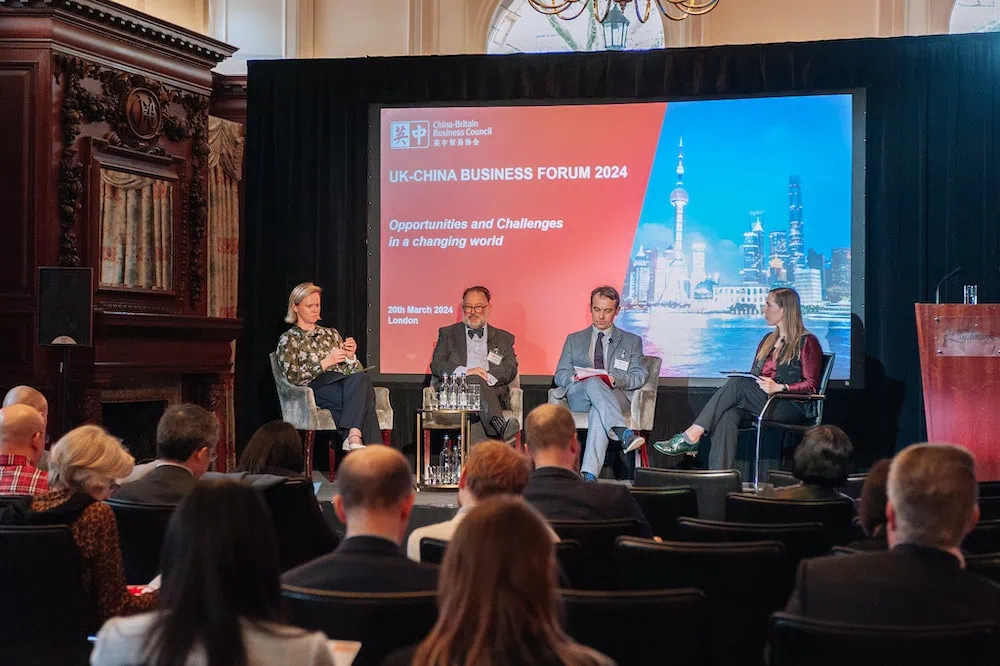
The third panel of the day was on healthcare and biosciences
Panel 3: Healthcare and Biosciences
Speaking at the Forum’s third panel discussion, which was moderated by Elinor Greenhouse, Senior Adviser, Tech and Innovation, China-Britain Business Council, Sue Welburn, Vice Principal Global Access & Professor of Medical & Veterinary Molecular Epidemiology, University of Edinburgh, emphasised the persistent demand for UK academic partnerships in the fields of healthcare and biosciences.
Hilary Smith, SVP, Corporate & Commercial CGA and CCO Office, GSK, acknowledged the immense scale of the China opportunity but highlighted that innovation must be affordable and address challenges like the ageing population and the growing number of chronic diseases. She said that prevention is the obvious solution, but it is a long-term investment.
For example, a significant amount of funding goes to oncology in China, which leads to a number of products coming to market from China, and there are a lot of opportunities for partnerships. Companies need to look at where there is a need not being met that they can provide. They also need to consider where to compete and where to partner with local companies.
“The regulatory landscape for fast launch of products in China isn’t there yet – it has such a differentiated regulated landscape,” she says. “However, Hong King, via the Greater Bay Area (GBA), does offer a great opportunity for a fast first foot into the market,” Smith said.
Mark Hedley, Deputy Head of Investment Promotion, InvestHK, said that there has been a boom in the Hong Kong life sciences ecosystem since Covid. Hong Kong has the oldest life expectancy in the world and has similar demographic and ageing populations to mainland China, but it has an easier regulatory framework to operate in, has easy access to funding due to being in a financial capital, and offers tax rebates. Moreover, due to Chapter 18A, companies have the potential to launch on the Hong Kong Stock Exchange pre-revenue.
Hong Kong’s location gives companies the ability to leap into Mainland China via the GBA and gain larger datasets. “Hong Kong has four hospitals that allow trials from which you can launch into market, and as part of the GBA, there are a further 19 hospitals that can be entered without regulatory clearance,” Hedley said.
Welburn pointed out that one of the gaps in the biosciences field in China is early career researchers from universities, and this is one area where the UK and China can work together, as the UK produces lots of post-grads who are looking to develop a business.
However, Welburn cautioned that a balance needs to be struck between collaboration and competition. Subsidies in China are enormous, which can be problematic as it is hard to bring partnerships to the table when one side is heavily subsidised and the others are not. Previously, she said, research was based on equal funding but that doesn’t work with China.
David Game, VP Global Product for Medical Education, Elsevier, works closely with AI in the sector, including innovation around Apple and its Vision Pro headset. Even though the headset is not on sale in China, the country represents the third largest group of owners.
“Within the area of AI, we see ourselves as a trusted provider of high-quality data. In terms of building AI projects in China, the challenge is around copyright. What copyrights we hold outside China is different to China as it’s a different regulatory regime between the US and China,” he said.

The final panel of the day was on supply chain management
Panel 4: Supply Chain Management
The importance of supply chains to the global economy couldn’t be more pronounced following the challenges of the Covid pandemic. The fourth panel of the day, which was moderated by Lise Bertelsen, Executive Director, Public Affairs, China-Britain Business Council, emphasised that from micro-SMEs to MNCs, supply chains involve multiple components and can be complex systems ranging from planning and sourcing to the production and delivery of goods and services.
As a result, supply chain management can be costly, so it is important to understand ROI and logistics. Organisations like CBBC and The Institute of Export and International Trade have the resources and network to support companies in this, and using third parties for advice can be a key component to market entry.
During the panel, Jane Liang, Chief Procurement Officer, Diageo, highlighted that setting up an R&D centre in Shanghai in 2023 – which was an industry first – has allowed Diageo to create a localised and customised understanding of the China market. It is also able to source materials locally and have staff on the ground to manage processes, ensuring efficiency.
Marco Forgione, Director General, The Institute of Export and International Trade, acknowledged that geopolitical issues are turning some companies or countries away from offshore supply chains due to recent disruptions. However, his view is that this is unlikely to happen in any meaningful way, as innovations are already allowing for transparency, and alternative routes and collaboration between logistic firms (for example, air and freight) are allowing for dynamic solutions.
James Grayland, International Director, Heighten, emphasised that it is important to do your homework on the regional infrastructure surrounding your supply chains, create your own business plan, carry out risk assessments, and have definitive objectives. It is also worth considering the choice of air, rail or maritime transportation against the backdrop of sustainability and the impact of this on consumer pricing. This is especially the case in the Chinese context, as value for money is increasingly important for consumers facing economic headwinds.
The panel discussion drew to a close by noting that it is vital to understand strategic and economic commitments when looking at your supply chains and that carrying out a risk assessment of external factors, such as geopolitics and competitors, is key.
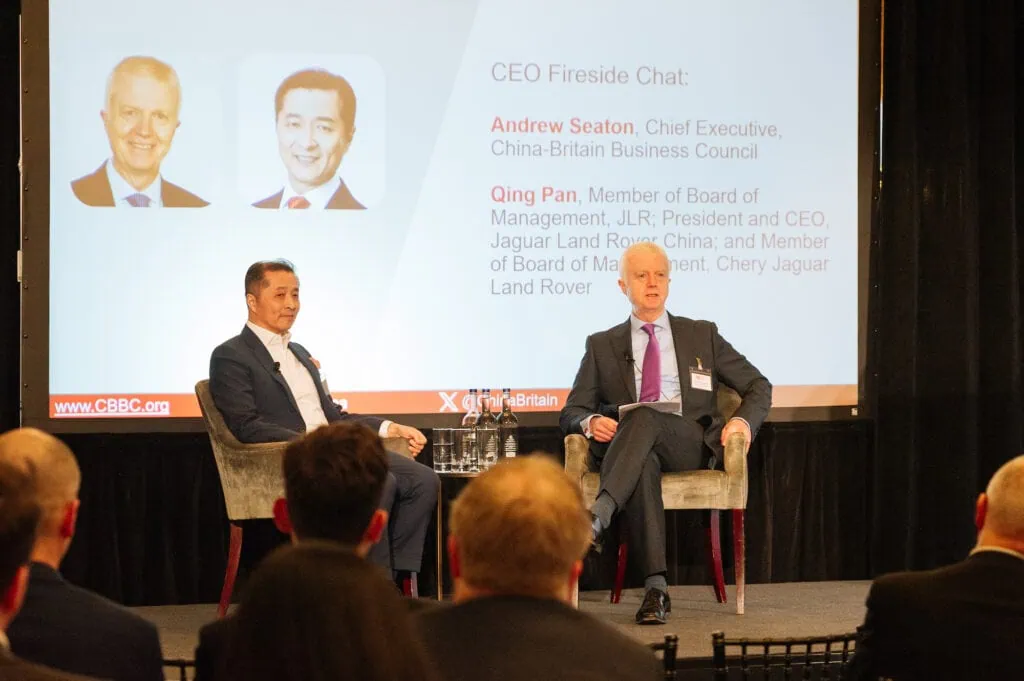
The forum concluded with a fireside chat between Andrew Seaton and Qing Pan, president and CEO of Jaguar Landrover China
Fireside Chat
The UK-China Business Forum ended with a Fireside Chat between CBBC CEO Andrew Seaton and Qing Pan from Jaguar Land Rover. Pan talked about the importance of China in the global automotive market on both the supply and demand side.
He explained that JLR has evolved from a marketing and sales department in China to a full-blown business, with every element of the supply chain, including a key innovation centre, located in China.
Discussing the EV market, Pan said that EVs account for 40% of China’s new car sales – a much faster uptake than in the West due to early investment by both companies and the government. For example, in 2017, the Chinese government publicised the new emission standards required from car manufacturers, which were only possible to hit if you had a portfolio of EVs.
“Private businesses in China know they can’t surpass the 100-year history of combustion engine cars, but they do think they can win the EV model. Why? Because Western companies are in defending positions and juggling two balls in the air. Chinese companies can go all in,” he said.
Seaton pointed out that this is why we have seen tech companies in China – such as Xiaomi – launch EVs rather than just the traditional automotive manufacturers.
Seaton and Pan also discussed geopolitics as being a hurdle. If large-scale Chinese investment into the West leads to trade barriers, it will hurt all parties. Trump has threatened to place 100% tariffs on Chinese products as part of economic nationalism, which will have a devastating impact on the EV market and, by extension, the environment.
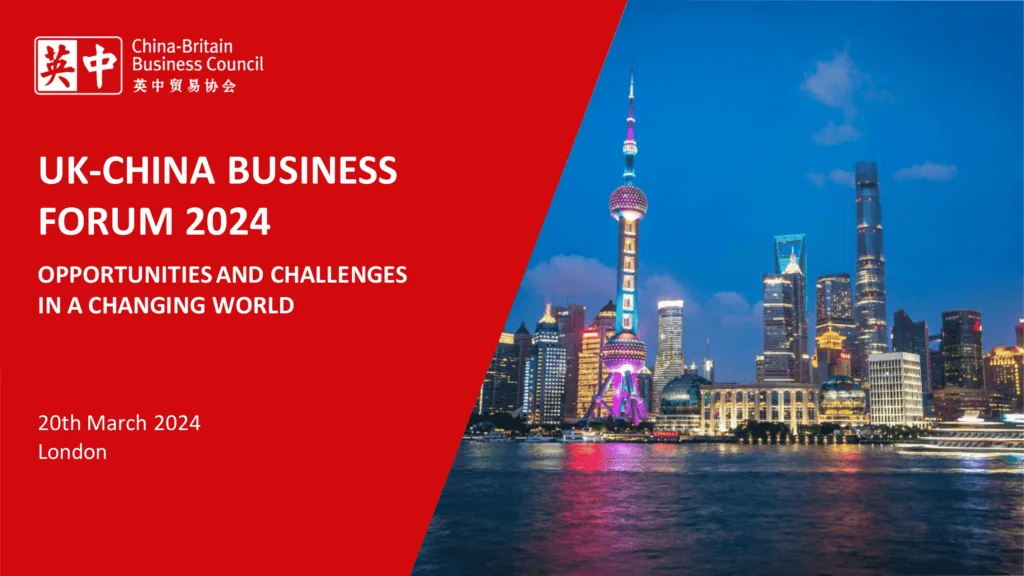
The event was made possible with the support of CBBC’s sponsors: HSBC, Invest HK, JLR, Standard Chartered, the UK Government Department for Business & Trade, and Deloitte.
Learn more about the UK-China Business Forum 2024, including the full agenda, list of speakers and speaker biographies here.
Browse photos from the event here.
Keep up to date with CBBC’s events calendar here. Learn about CBBC’s membership offer here. For further enquiries related to the event, please contact enquiries@cbbc.org.



